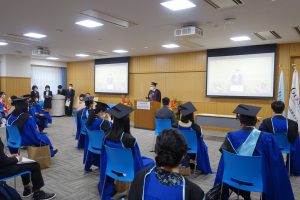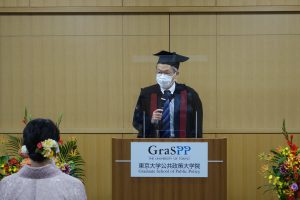AY2021 GraSPP Autumn Diploma Presentation Ceremony
 The GraSPP Autumn diploma presentation ceremony AY2021 took place on Friday, September 24 at SMBC Academia Hall in the International Academic Research Building.
The GraSPP Autumn diploma presentation ceremony AY2021 took place on Friday, September 24 at SMBC Academia Hall in the International Academic Research Building.
49 students were conferred the diploma this September.
In order to prevent spreading the Coronavirus, the ceremony was conducted on a smaller scale and the diploma was presented by Professors of the Graduate School of Public Policy and congratulated for their completion of the program together with GraSPP staff.
The commendation ceremony for high-achieving graduates was also held. The Best Performance Award was presented to one student in PhD program and one in Master program respectively.
Dean’s message to graduate students
On behalf of graduate school of public policy at the University of Tokyo, I am very pleased to welcome you as the graduates of the class of 2021. Congratulations for your excellent achievement. I am proud of you for this great milestone of your lives. Congratulations also to your families and friends, siblings, partners, and the loved ones, who have supported you all along to this date. This year, we welcome 49 new graduates, including four PhD’s. The nationality of this year’s graduates ranges over 14 countries, and about a third of the graduates attend virtually today.
More than a year and half into the covid-19 pandemic, none of us could imagine that we are still wearing mask, sanitizing our fingers, and keep distancing like we do here. The spread of the virus and its variants has brought many setbacks and challengers to almost all of us. Starting from the second half of your first year, you had to stay away from our physical campus, and had to give up the important parts of your days with classmates on the university premise. Some students experienced difficult time traveling back from other places to Tokyo, or from Tokyo to home countries. I extend my most sincere sympathy to those of you who face difficult time caused by covid-19.
This pandemic has caused terrible social and economic consequences. In 2020, the global economy collapsed. Social, health, and economic inequalities increased. According to the International Labor Organization, more than 100 million jobs were lost last year with a huge impact on women, migrants, and disabled people.
The pandemic also starkly increased the number of people facing food insecurity. The World Food Program estimates the total number of people at risk of acute hunger heightened by more than 100 million in 2020.
We also saw global fragilities continued the rise. The climate crisis is imminent. Natural disasters caused 210 billion dollars in damage in 2020. Heat waves fueled wildfire, and hurricanes and flood caused incalculable human damages.
And yet we saw geopolitical tensions continued to be exposed. Ideologies are clashed and divided, and democracy was dying, and humanitarian needs were imminent.
Policymakers around the world face these formidable challenges — in public health, food program, debt management, fiscal and monetary policies, education system, climate mitigation and adaptation, economic and energy security, and many others. And these issues are mostly not confined within the boundary of the nation, but rather inter-national in nature.
Facing quite uncertain and volatile future, cooperation across borders is essential in tackling these challenges. Now more than ever, it is essential to share the knowledge we have gained and make progress in cooperation with one another.
Back in old times in Japan, commerce was active in the west including Osaka and Shiga. In the west there, it’s been said as practical wisdom that the working principle of the company should not be driven by self-interest by rather on “Sampo Yoshi(三方良し),” that is try to satisfy three stakeholders, your customers, the society, and yourself. This principle has been recently re-discovered worldwide in the recognition of stakeholder capitalism, instead of mere shareholder capitalism.
You now leave the GraSPP and go forth to the world that has been totally changed from two years ago. With your skills acquired at GraSPP and exposure to Japanese society and culture, I hope a member of Class 2021 to advance good governance and improve the lives of other people in our shared world.
Lastly, the class of 2021 especially on master’s programs is a special cohort to me, as my tenure of deanship mostly overlap with your two years of GraSPP days. Through student council and online interviews, you have offered me numerous and invaluable suggestions and pointed me where I should look at to improve the quality and integrity that GraSPP should keep aiming at.
In response to your requests, GraSPP have now set up a new committee comprising of various backgrounds of faculty members, prioritize your suggestions and start working one by one. For example, we recently sent out questionnaires to all the alumni in our email list, and asked if they are interested in serving as clients for Capstone courses we are about to experiment next year. There have been quite a few positive responses so far from the alumni to volunteer to help.
As a new member of GraSPP alumni, we will keep in touch with you, and ask for your advice and inputs, and sometimes inquire you to participate GraSPP events, or even speak in our classrooms.
In the meantime, please be safe, be healthy, and stay in touch. Keep us updated what you do. We are always here to welcome you back at any time. Again congratulations!

24 September, 2021
Hiroshi Ohashi, Dean
Graduate School of Public Policy, the University of Tokyo

